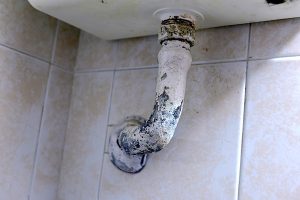Call it a fee, not a tax, but look out, unincorporated Fayette residents — a new bill is likely headed your way.
With the blessing of the Fayette County Commission, county staff is preparing to implement a new stormwater utility that would be funded by an annual fee
charged to all property owners in the unincorporated county. The final proposal, however, must be approved by a majority of the commission to be officially implemented.
The matter is expected to come up for a vote later this year.
To reach the county’s stormwater goals will involve a fee that costs the average homeowner about $70 a year, with some paying less and some paying more. The fee is based on the square footage of impervious surface on a given lot, which means not just the footprint of the house, but also the driveway, the garage and any other ancillary structures such as a barn or shed.
The fee is already a matter of debate, as County Commissioner Lee Hearn said the $70 figure is too high for what he’s comfortable doing.
“It had better be in line with what our surrounding counties are doing,” Hearn said, adding that he wanted to make sure the utility has an impact.
“I will tell you this, there is certainly not a shortage of projects that money can be spent on,” replied County Manager Jack Krakeel.
By comparison, most residential bills in Peachtree City are between $36 and $72 a year, also depending on the amount of impervious surface on the lot.
Part of the problem with funding stormwater operations out of the general fund is the argument that taxpayers in Fayetteville and Peachtree City would also be footing the bill for work that will be done exclusively in the unincorporated areas, said County Manager Jack Krakeel.
Both Fayetteville and Peachtree City have their own stormwater utility programs, and both assess fees to all property owners within their city limits. So in that respect, city residents could argue they were being “double taxed” for the same service.
The upside of a stormwater fee is that it can be assessed on entities that are immune to property taxes, such as churches and schools, which have significant impervious surface footprints, officials said.
Currently the county spends about $437,000 a year on stormwater improvement projects from the general fund. But that has resulted in a backlog of projects, officials have said.
The stormwater fee, if eventually approved by the county commission, would go beyond infrastructure repair and replacement by adding a maintenance capability with a projected three-person crew.
The total estimated annual cost of such a program is $1.4 million, which would be raised by the bills costing an average of $70 per residence.
Lowering that figure to $60 a year will only bring in $1.22 million, and at $50 a year it would bring in $1.02 million, according to county calculations.
Vanessa Birrell, director of the county’s current stormwater program, said about 30 percent of the existing stormwater pipes have been inspected, which leaves a big question mark.
“The problem is we don’t have an entire inventory, so we don’t know every rusted-out pipe,” she said.
So far, staff has compiled a list of $1.08 million in necessary stormwater projects, with four of them being the most critical at a cost of $630,000.
The highest priority project is Merrydale Drive, as the stormpipe under the road gets closer to the point of causing the roadbed to collapse. Other top-priority projects include Kirkley Road, Emerald Lake Drive and Morning Dove Drive.
The pipe on Merrydale Drive is in such poor shape that it must be checked after each rainfall event, Birrell said.










Leave a Comment
You must be logged in to post a comment.